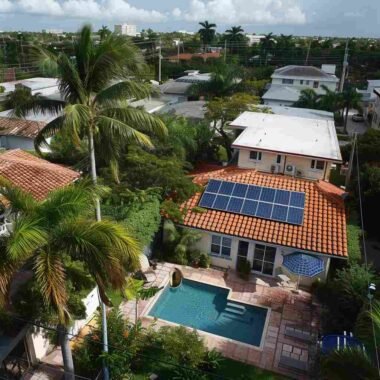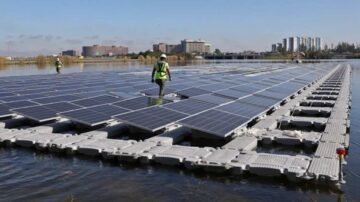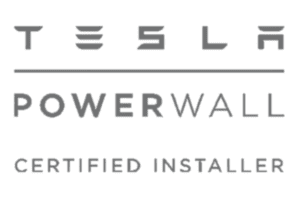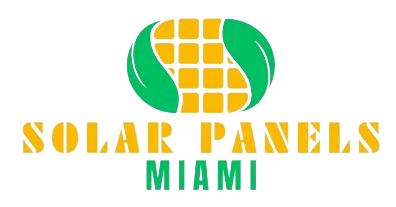Installing a solar PV system in Miami-Dade County involves understanding the planning and installation process, the types of solar equipment options available, and how maintenance and operation work.
It’s also essential to be aware of the financial aspect, which includes the cost of solar PV systems and the solar incentives, rebates, and permits that can make going solar more affordable.
Whether you’re a homeowner, business owner, or part of the wider community, understanding the local solar market and regulatory landscape will help you navigate the process of solar PV system installation.
Call now to get a free quote
Local Solar Market
If you’re considering solar panels for your home or business, you’ll be joining a growing number of buildings harnessing solar energy. Miami-Dade’s commitment to sustainability is reflected in the increasing number of solar installations across the city.
- Average Cost: A 5 kW solar panel system in the county, before incentives, has an average cost which you could further reduce through federal tax credits and other local solar incentives.
- Installers: With numerous reliable installers in the area, you’ll find the right professional for your solar project.
Regulatory Environment
Your decision to adopt solar energy must be informed by local regulations. Miami-Dade County has designed green building and energy-efficiency regulations to facilitate the transition to solar power. Here’s what you need to know:
- Permitting: The county has streamlined the process for solar photovoltaic (PV) projects, which now can be handled through an online portal for easier compliance.
- Net Metering: Miami-Dade offers net metering, allowing your solar system to feed excess energy back into the grid, effectively crediting your utility account and promoting energy efficiency.
Federal Solar Tax Credit
The Federal Solar Tax Credit, also known as the Investment Tax Credit (ITC), allows you to deduct a substantial percentage of your solar PV system cost from your federal tax bill. In 2024, you have the opportunity to apply a credit of 30% of the total system cost, which includes both solar panels and installation.
State and Local Incentives
You may capitalize on various programs including property tax abatement where, for residential properties, 100% of the added value due to solar installation is exempt from your property taxes, and 80% exemption is available for non-residential properties.
The Property Assessed Clean Energy (PACE) financing can facilitate loan repayment through your property tax bill for solar installations, making it easier to manage finances.

Selecting Solar Installers
Michael Coleman from SolarPanelsMiami.org emphasizes that understanding the permitting process is a crucial yet often overlooked way to cut down solar installation costs. Choosing a solar installer with a deep understanding of Miami-Dade County’s specific requirements and regulations is vital.
Permitting and Approval
Jeff Ellis from SolarPanelsMiami.org notes that in Miami-Dade County, the permit process for solar installations is comprehensive, ensuring compliance with safety and local building codes.
SolarPanelsMiami.org assists clients by demystifying this process, highlighting the need for documentation like wind load compliance and structural requirements.
Choosing Solar Panels
- Panel Type: You’ll choose between monocrystalline, polycrystalline, and thin-film panels. Monocrystalline panels are highly efficient and perform better in hot climates like Miami-Dade’s.
- Efficiency: Look for panels with higher efficiency to make the most of your available roof space.
- Durability: Ensure your panels are rated for the local climate and can withstand weather conditions; Miami-Dade has specific building codes due to its susceptibility to hurricanes.
- Aesthetics: If you have a standing seam metal roof, you might prefer solar panels that complement its look while ensuring minimal penetration during installation.
Mounting and Inverter Selection
- Mounting Systems: Your solar mounting system should accommodate the type of roof you have. For standing seam metal roofs, choose mounting solutions that clamp onto the seams, preserving the roof integrity.
- Inverters: The inverter converts DC electricity from your panels to AC for home use. Opt for string inverters for a cost-effective solution or microinverters for enhanced performance on complex roofs.
- Orientation and Angle: Mount your solar panels at the optimal angle and orientation to harness the most sunlight, taking into account Miami-Dade’s latitude.
Financing and Payment Options
To finance your solar PV system, there are several options:
- Solar Loan: This allows you to own your system outright. You’ll make monthly payments on the loan, but the system’s energy production can offset your electricity bills, potentially leading to long-term savings.
- Solar Lease/Power Purchase Agreement (PPA): With either of these options, you don’t own the solar panels. Instead, you agree to pay a fixed monthly rate for the energy they produce or a lease payment, which can be lower than your traditional electricity bill.
Solar Lease Agreements
A solar lease agreement allows you to rent a solar PV system from a solar installer. Under this arrangement, you pay a fixed monthly fee for the use of the solar panels.
The advantage is that you typically have no upfront costs and maintenance is often covered by the provider. However, since you don’t own the equipment, you may not be eligible for certain solar incentives that come with purchase.
Power Purchase Agreements
With Power Purchase Agreements (PPA), you agree to have solar panels installed on your property by a solar services provider. Instead of paying for the panels, you purchase the electricity they produce at a predetermined, and often lower, rate than your local utility company.
Long-Term System Care
Ana Pirez of SolarPanelsMiami.org advises regular cleaning and annual maintenance checks by professionals for your solar panels to maintain efficiency.
She highlights the importance of removing obstructions like debris and dirt and having electrical components and hardware inspected.
Net Metering
Net metering allows you, as a solar photovoltaic (PV) system owner, to send surplus energy back to the grid in exchange for credits.
In essence, when your solar panels produce more electricity than you use, net metering enables your electric meter to run backwards, providing financial compensation for the excess.












